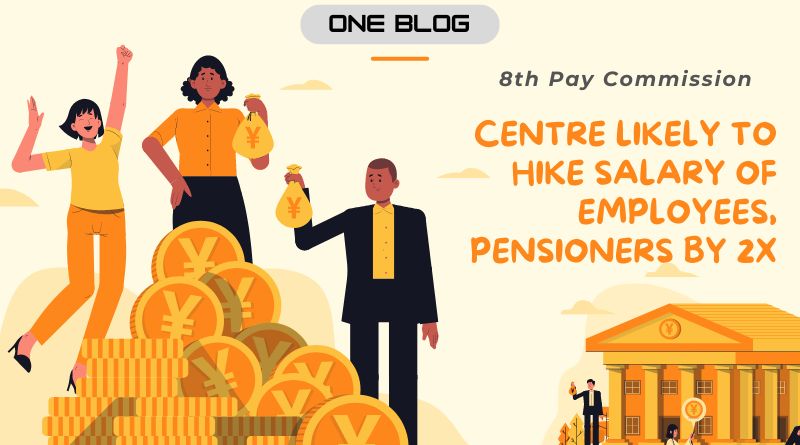According to the reports, the Central government is likely to set up the 8th Pay Commission by January 1, 2025. With the implementation of the 8th Pay Commission, it will benefit more than one crore central government employees and pensioners. However, it is important to note that there is no official confirmation on this matter from the authorities. Usually, the government implements the new Pay Commission recommendations once every 10 years. The 7th Pay Commission came into effect on January 1, 2016.
The 7th Pay Commission
To recall, when it came to salary revision for the 7th Pay Commission, the Employee unions had demanded a 3.68 fitment factor, but the government decided on a fitment factor of 2.57. The minimum basic pay became Rs 18,000 per month, compared to the Rs 7,000 in the 6th Pay Commission. The minimum pension also rose from Rs 3,500 to Rs 9,000.
Expectations from the 8th Pay Commission

Based on some reports, a fitment factor of 1.92 may be taken for the 8th Pay Commission. According to the reports, Shiv Gopal, the General Secretary of the All India Railwaymen’s Federation, has predicted that the central government will announce the Eighth Pay Commission shortly. However, it is important to note that the government hasn’t confirmed anything yet.
Important points
- According to the reports, the 8th Pay Commission is likely to be constituted in 2025, with its recommendations expected to take effect from 2026.
- Considering the trends from previous pay commissions, the employees can expect a substantial salary increase. Estimates indicate a potential hike of up to 34% for Level 1 employees and up to 100% for Level 18 employees.
- The Unified Pension Scheme (UPS) is also expected to benefit from the 8th Pay Commission, with potential increases in pension amounts.
- The 8th Pay Commission is expected to introduce a revised pay matrix. This will result in higher salaries for government employees.
Calculation of Salary and Pension According to 8th Pay Commission
- The 8th Pay Commission could raise the minimum salary for Level 1 employees from 18,000 to Rs 34,560, with a fitment factor of 1.92.
- For Level 18 employees, the maximum salary could increase from 2.5 lakh to 4.8 lakh.
- Pension calculations under the Unified Pension Scheme (UPS) would also change.
- Assuming a 50% pension formula and a 20% increase in Dearness Allowance (DA) by 2030, a Level 1 employee could receive a pension of approximately Rs 20,736, while a Level 18 employee might get up to 2,88,000.
The Newly Introduced Unified Pension Scheme
In a matter of good news for central government employees, the Unified Pension Scheme (UPS) was introduced last week. It is a balanced approach between the Old Pension Scheme (OPS) and the National Pension System (NPS). The announcement received a positive response from the National Federation of Indian Railwaymen (NFIR). Notably, this announcement comes amid discussions around the potential timing of the 8th Pay Commission, further highlighting the government’s focus on addressing employees’ and pensioners’ concerns.
Suggested read: Healthy and Nutritious Food for Busy Professionals
UPS Vs NPS Vs OPS

The just-announced Unified Pension Scheme for central government employees will be available only for those who are currently subscribers of the New Pension Scheme (NPS), including retirees. Over 23 Lakh Govt Employees Under NPS To Get UPS.
The new scheme guarantees employees 50 percent of their average basic pay over the last 12 months as a pension. This is for a minimum qualifying service of 25 years. According to this scheme approved by the Union Cabinet, the pension will be proportionate for a lesser service period of up to a minimum of 10 years. Also, there is an assured pension of Rs 10,000 per month on superannuation after a minimum of 10 years of service.
The scheme has been brought out to address the concerns of government employees over NPS, which came into effect on January 1, 2004. Under the old pension scheme (OPS), effective before January 2004, employees got 50 percent of their last drawn basic pay as pension.
Under the NPS, the employer contribution is 14 percent, and the employee contribution is 10 percent. However, the last payout depends on the market returns on that corpus, mostly invested in government debt.
Unlike the old pension scheme, UPS is contributory, where employees will be required to contribute 10 percent of their basic salary and dearness allowance while the employer’s contribution (the central government) will be 18.5 percent.
The NFIR has appealed to the central government to establish a new, 8th Pay Commission. Their main goal with this commission is to help determine an appropriate employee salary. So, it’s expected that the announcement of the 8th pay commission will come soon.





